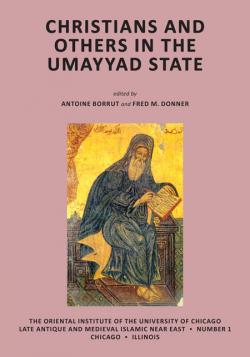LAMINE 1. Christians and Others in the Umayyad State Antoine Borrut and Fred M. Donner, eds., with contributions by Touraj Daryaee, Muriel Debié, Sidney H. Griffith, Wadad al-Qadi, Milka Levy-Rubin, Suzanne Pinckney Stetkevych, Donald Whitcomb, and Luke Yarbrough
 Editorial Board: Antoine Borrut and Fred M. Donner
Editorial Board: Antoine Borrut and Fred M. Donner
Purchase Download Terms of Use
The papers in this first volume of the new Oriental Institute series LAMINE are derived from a conference entitled “Christians, Jews, and Zoroastrians in the Umayyad State,” held at the University of Chicago on June 17–18, 2011. The goal of the conference was to address a simple question: Just what role did non-Muslims play in the operations of the Umayyad state? It has always been clear that the Umayyad family (r. 41–132/661–750) governed populations in the rapidly expanding empire that were overwhelmingly composed of non-Muslims — mainly Christians, Jews, and Zoroastrians — and the status of those non-Muslim communities under Umayyad rule, and more broadly in early Islam, has been discussed continuously for more than a century. The role of non-Muslims within the Umayyad state has been, however, largely neglected. The eight papers in this volume thus focus on non-Muslims who participated actively in the workings of the Umayyad government.
This new Oriental Institute series — Late Antique and Medieval Islamic Near East (LAMINE) — aims to publish a variety of scholarly works, including monographs, edited volumes, critical text editions, translations, studies of corpora of documents — in short, any work that offers a significant contribution to understanding the Near East between roughly 200 and 1000 CE.
- Late Antique and Medieval Islamic Near East 1
- Chicago: The Oriental Institute, 2016
- ISBN 978-1-614910-31-2
- Pp. x + 214; 18 figures
- Paperback 7 x 10 in
- $24.95

